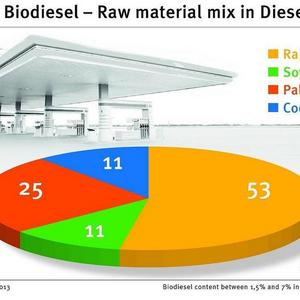UFOP samples 60 stations, finds biodiesel feedstock diversity up

July 12, 2013
BY UFOP
With 53 percent raw material content, rapeseed oil remains the most important raw material source for the production of biodiesel in Germany, followed by palm oil with 25 percent, and coconut and soy oil at 11 percent each. This is the result of the study presented by the Union zur Förderung von Oel- und Proteinpflanzen e.V. (UFOP). Sixty filling stations of mineral oil companies throughout Germany—weighted according to market shares—were sampled and the biodiesel component in the diesel fuel, as well as its raw material composition, were determined on behalf of the UFOP.
In 2010 and 2011, German agriculture benefitted from the fact that practically only certified rapeseed from domestic production was available after the immediate national implementation of the Renewable Energies Directive. The raw material mix now determined reveals that the certification systems approved by the EU Commission have now also been introduced in countries outside the EU such as Argentina, Brazil as well as Indonesia and Malaysia. In other words, the supply of sustainably certified raw materials for biofuel production has meanwhile become globalized, according to UFOP.
Advertisement
Advertisement
It is a stipulation of the international laws that market access may not be denied if the specified ground rules are complied with. Nevertheless, the UFOP has serious misgivings and believes that closer attention must be paid in respect to the quality of the national implementation and the certification introduced in the sense of fair competition, but also nature and environmental protection locally. The RED makes it possible to examine the quality of the sustainability certification. In contrast to all other utilization options for biomass in the food or chemical industry, a statutory basis for sanctions exists here. Market access to the EU can be denied or the apportioning of imported biofuel quantities from countries outside the EU to the quota obligation can be rejected if the documentation as a prerequisite for compiling sustainability validations does not correspond to the requirements of the certification systems.
As this involves so-called voluntary systems, the UFOP urges the EU Commission to set out strict rules for the quality of the implementation and monitoring by the certification body as well as the responsible authorities of the member states. Thus, for example, a certificate of origin for the biofuels, beginning with the cultivation region, is possible without any problem thanks to modern satellite technology.
Advertisement
Advertisement
Instead of calling into question the prospects of the European biofuel industry and hence retention of the certification systems with sometimes impractical proposals, the EU Commission and the members of the European parliament should recognize the pioneering role of biofuels and push forward the further development of certification systems for avoiding bypassing measures. The UFOP is convinced that sustainability certification systems will be superfluous in future, if the first generation of biofuels is superseded as an element in a European strategy for climate and resource protection.
The study is available for downloading at www.ufop.de.
Related Stories
The USDA has announced it will delay opening the first quarterly grant application window for FY 2026 REAP funding. The agency cited both an application backlog and the need to disincentivize solar projects as reasons for the delay.
CoBank’s latest quarterly research report, released July 10, highlights current uncertainty around the implementation of three biofuel policies, RFS RVOs, small refinery exemptions (SREs) and the 45Z clean fuels production tax credit.
The USDA significantly increased its estimate for 2025-’26 soybean oil use in biofuel production in its latest World Agricultural Supply and Demand Estimates report, released July 11. The outlook for soybean production was revised down.
U.S. fuel ethanol capacity fell slightly in April, while biodiesel and renewable diesel capacity held steady, according to data released by the U.S. EIA on June 30. Feedstock consumption was down when compared to the previous month.
The U.S. EPA on July 8 hosted virtual public hearing to gather input on the agency’s recently released proposed rule to set 2026 and 2027 RFS RVOs. Members of the biofuel industry were among those to offer testimony during the event.
Upcoming Events










